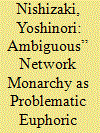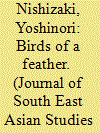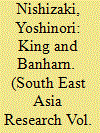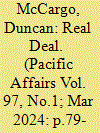|
|
|
Sort Order |
|
|
|
Items / Page
|
|
|
|
|
|
|
| Srl | Item |
| 1 |
ID:
193633


|
|
|
|
|
| Summary/Abstract |
Frequently cited in the literature on recent Thai politics, Duncan McCargo’s influential “network monarchy” concept is nonetheless inadequately developed. As such, it has been questioned and challenged by several scholars in recent years. In his 2021 Pacific Affairs article, McCargo rebuts many of these scholars’ arguments and defends his concept. His defence is unpersuasive, however. It falls short of elaborating on the scope, composition, and modus operandi of network monarchy, leaving the shortcomings of his original concept unrectified. Most seriously, McCargo now accentuates the “ambiguous” quality of network monarchy—a quality he did not emphasize originally—in order to accommodate new empirical anomalies and counter his critics. By so doing, he renders his argument unfalsifiable. Drawing on Robert Cribb’s thoughts, this article first spells out why or how the insufficiently developed network monarchy concept has become so widespread in the first place. It then examines the untenable nature of McCargo’s rejoinder to his critics, especially to Eugénie Mérieau.
|
|
|
|
|
|
|
|
|
|
|
|
|
|
|
|
| 2 |
ID:
175549


|
|
|
|
|
| Summary/Abstract |
This article attempts to illuminate Duncan McCargo's influential yet ambiguous concept of ‘network monarchy’ — the source of political power wielded by Thailand's royalist establishment. Drawing on Thai-language primary sources, especially cremation volumes, I argue, first, that many individuals who have made up various institutional components of the network monarchy come from a constellation of traditional royalist families that have intermarried with each other. Contrary to what McCargo suggests, these people are not just bound by their devotion to the monarchy alone, but also by their families’ pervasive intermarriage ties forged over many decades. These ties have given the network monarchy additional resilience, even though not all its members toe the ideological line all the time. My second argument concerns the temporal context in which the network monarchy has come into being. Although McCargo makes it seem that the late King Bhumibol developed the network monarchy — his personal patronage network — as a political tool from scratch in the post-1973 period, it has actually grown, in part, out of the pre-existing elite family networks. I develop these twin arguments by using the case of one royalist prime minister — Anand Panyarachun — as a focal point of analysis.
|
|
|
|
|
|
|
|
|
|
|
|
|
|
|
|
| 3 |
ID:
120006


|
|
|
|
|
| Publication |
2013.
|
| Summary/Abstract |
Duncan McCargo's influential model of 'network monarchy' enables us to understand how King Bhumibol Adulyadej has mobilized his nationwide patronage network to shape contemporary Thai politics. This model, however, focuses mainly on the conflicts between reform-minded virtuous leaders (represented by Bhumibol) and unprincipled, self-serving politicians, and pays insufficient empirical attention to the porous boundaries between the two. The author makes up for this weakness by unravelling the historical process through which Bhumibol has developed a symbiotic, if ambiguous, relationship with Banharn Silpa-archa, regarded as the epitome of unscrupulous rural-based politicians. The author shows that the two have used each other for their respective political purposes. In an effort to protect and advance his personal and dynastic interests, Bhumibol has found it necessary and expedient to rely on Banharn as a valuable political ally. Banharn, for his part, has relied on the king and his proxies to legitimate and consolidate his authority at the local level. By casting light on this interdependence between the two seemingly contrasting types of leader, the paper contributes to a further elaboration of McCargo's model and, more generally, to a deeper understanding of the complexity of Thailand's patronage politics.
|
|
|
|
|
|
|
|
|
|
|
|
|
|
|
|
| 4 |
ID:
193641


|
|
|
|
|
| Summary/Abstract |
Thailand’s 2023 election outcome did not correspond with the results: the Move Forward Party “won” the polls, but runner-up Pheu Thai ended up forming the government. How could this have happened? This article offers two explanations. First, results and outcomes have typically differed in recent Thai elections: in itself, the substitution of Pheu Thai for Move Forward was nothing unusual. Second, in 2023 an elite pact was in place to ensure that Pheu Thai and the country’s conservative elite could engage in a form of promiscuous power-sharing following the May 14 polls. The article explains the politics behind this deal-making, and argues that the creation of the Srettha Thavisin government may not have been an accidental electoral outcome, but could have formed part of a deliberate strategy by the Thai establishment.
|
|
|
|
|
|
|
|
|
|
|
|
|
|
|
|
|
|
|
|
|